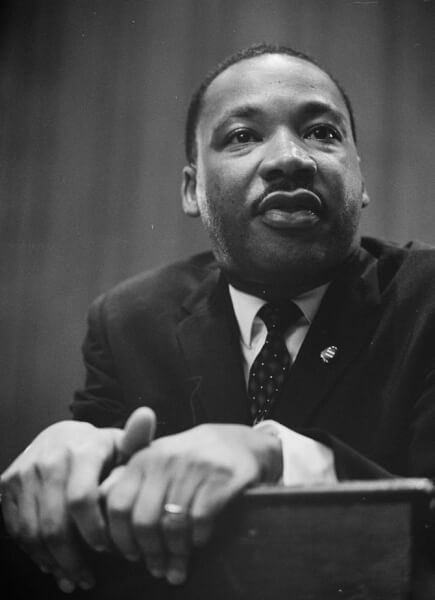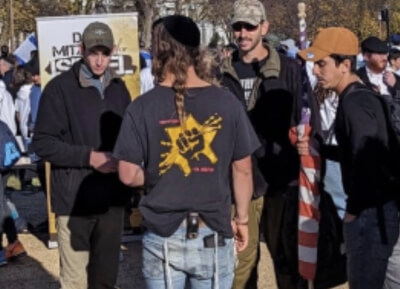Palestinians should use US Civil Rights movement as template for freedom
One of the biggest problems facing the Palestinians are the activists who bully and block any effort to achieve peace. They urge violence using euphemisms like “popular mobilization,” a term encouraging violent activism, rather than non-violent peaceful protest. The extremists have always believed that violence by Palestinians, though costly in Palestinian lives, would turn the tables on Israel and result in Israel’s destruction. Of course, they have been advocating that for 70 years and it has never worked. Yet they obstruct all peace plans. Palestinians need to eschew these fanatics and embrace the non-violent protests of Mahatma Gandhi and the Rev. Martin Luther King Jr.
By Ray Hanania
Some people learn lessons from the history of racism and the civil rights movement to find their moral compass. Others see civil rights as an impediment and use the experiences to find ways to reinforce racism with excuses.
In the fight for civil rights, however, one important component is the role of the mainstream news media in shining a spotlight on racism. Media coverage becomes a powerful pressure to discourage racist policies, which is why Israel’s media is doing everything possible to avoid coverage of anti-Arab racist events, or to provide excuses and alibis when they have no choice.
Israel’s government has adopted 65 laws that discriminate against non-Jews, it has implemented a system that prevents non-Jews from becoming members of government-funded Kibbutzim and illegal settlements, and it turns its back on the racist confrontations that occur in its largest cities.
But Palestinians can look back at history to do a better job of presenting their righteous civil rights grievances against Israel without being portrayed as resorting to violence or angry protests. They can beat Israel by being smart.

Last week, Jewish residents in the northern Israeli city of Afula protested after learning that a Palestinian family had bought a house there. The protesters included the city’s Jewish deputy mayor and other elected officials.
Ironically, Afula was originally an Arab town until 1925, when the American Zionist Commonwealth, with the help of the pro-Jewish British government, forcibly expelled all the Arab residents to repopulate it with Jewish immigrants. It was one of the first of hundreds of Arab towns in the new state of Israel to be “cleansed” of Arabs.
Rather than denounce the racist protests, most of Israel’s news media and almost all mainstream American news media ignored them, pretending they did not happen. Those few outlets that did write stories tried to justify the racist complaints, incredulously arguing that Jewish residents in Afula have a right to be afraid of Palestinians moving in because the latter are involved in violence against Israelis.
Palestinians can look back at history to do a better job of presenting their righteous civil rights grievances against Israel without being portrayed as resorting to violence or angry protests.
— Ray Hanania
The Afula story is ironic because American Jews played such a significant role in igniting the anti-racism civil rights movement in the US in the 1950s. Yet the civil rights movement could not have been successful without the support of the mainstream American news media. Reports of racist incidents embarrassed governments and kept political leaders in check. The coverage of the racism shamed many Americans into reassessing their own beliefs about race, opening the door to change.
On Dec. 1, 1955, a 42-year-old African-American seamstress named Rosa Parks boarded a public bus in Montgomery, Alabama. After she refused to give up her seat to a white passenger, she was arrested and charged with violating the segregation laws. The black community in Montgomery organized a protest led by an obscure pastor named Martin Luther King Jr., who decided to turn the bus incident into a national legal challenge to America’s racist segregation laws.
Parks wasn’t the first black person to be arrested for refusing to take a seat at the back of a public bus in Montgomery. It had happened many times before but, just like in Israel, where the Israeli-owned news media suppresses coverage of anti-Arab racism, the white-owned American mainstream news media downplayed or excused the racism.
This time was different. Four days after Parks was arrested, the Associated Press wire service detailed her story and the legal fight King had launched in a report that was picked up by newspapers and TV stations around the country.
That morning, Americans woke up to the shocking reality that human beings were being discriminated against simply because of the color of their skin. Blacks were being threatened, beaten and lynched simply for demanding that they be treated equally. The mainstream news media reports on Parks challenged claims that the racism was justified because of threats of violence by blacks against whites and made it impossible for Americans to turn away from that reality.
The American civil rights movement began in earnest with the courage of one African American, but it took the news media’s morality to overcome racist antagonism and fuel a campaign that helped put an end to America’s ugly racial practices.
I’m not sure if today’s news media have the same moral character as their predecessors did in 1955. Certainly, many American officials do not, as exemplified by Nikki Haley, the US Ambassador to the UN. Instead of standing up to Israel’s brutality in the Gaza Strip, Haley denounced the UN as the US withdrew from its Human Rights Council.
Yet, despite that, Palestinians can’t give up on peaceful, legal protests or the idea that the news media cannot be influenced in a positive way. We can change the news media’s bias by better understanding how it works and by underwriting strategic communications campaigns to help the American public understand the reality of the Palestinian story in Afula and in Gaza.
There is a sacrifice and the challenge is overwhelming. Parks never chose to become the symbol of the fight against racism. Her life was made difficult for years; she lost her job as a seamstress and was forced to leave her home and move to another state. A decade later, in 1965, Parks was hired as a secretary and receptionist by newly elected Michigan Congressman John Conyers.
Parks is a reminder to Palestinians that they can stand up to Israel’s racist laws and government practices. And they can withstand the bullying and lies by the Israeli and mainstream American news media too.
Palestinians can take Afula and build it up into a symbol of a civil rights fight that could change Israel. But they need to embrace peaceful non-violence, recognize the violence that is Israel, and pursue an effective strategic public relations campaign.
(Originally published in the Arab News. Permission to reprint with attribution to the author and this bio. Ray Hanania is an award-winning Palestinian American columnist and the author of several books including “Yalla! Fight Back.” His personal website is www.Hanania.com. Twitter: @RayHanania)


- Israelisnipers shooting and killing hospital workers in Gaza - December 11, 2023
- CAIR Condemns Israeli Executions of Wounded, Unarmed Palestinian in West Bank - December 11, 2023
- Arab and Muslim American voters face a “simple choice” between Biden’s inhumanity and Trump’s edgy politics - December 9, 2023

























